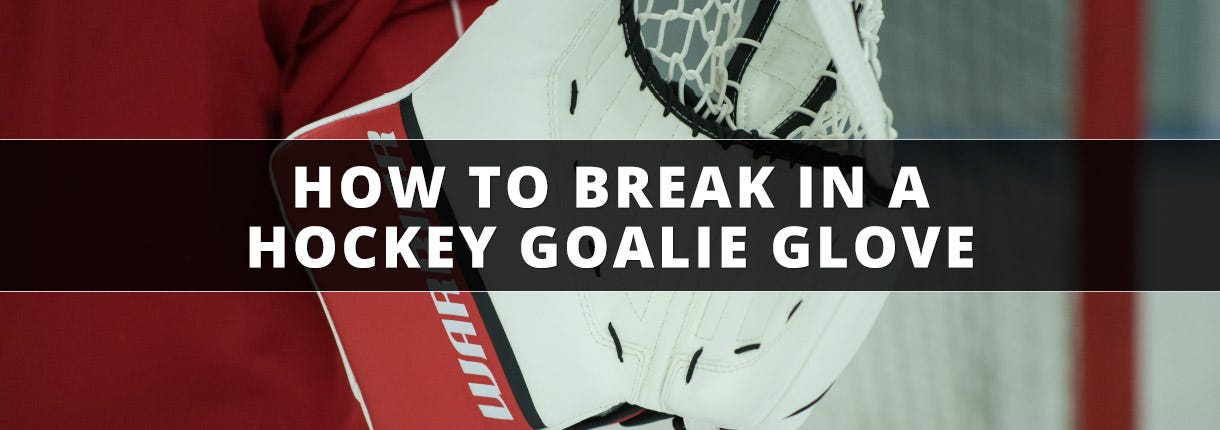Breaking in a hockey goalie glove is crucial for performance. A stiff glove can hinder your game.
Getting a new goalie glove ready takes some effort. You want it to be flexible and comfortable. This process will ensure the glove fits your hand perfectly. It also helps you catch pucks more effectively. Breaking in your glove the right way can make a big difference on the ice.
With some simple steps, you can soften the leather and shape it to your hand. This guide will show you how to do it properly, so you can focus on stopping pucks and enjoying the game.

Credit: www.youtube.com
Choosing The Right Glove
Choosing the right hockey goalie glove is crucial for your performance and safety. A well-fitted glove can make a significant difference in how you play. It can also impact how you break in your glove. Below, we will explore the key factors to consider and some popular brands to help you make an informed decision.
Factors To Consider
First, consider the fit of the glove. A snug fit offers better control. It should not be too tight or too loose. You should also think about the glove’s break-in time. Some gloves take longer to break in than others. Material is another important factor. Leather gloves often provide better durability. Synthetic gloves can be easier to break in. Lastly, consider your budget. High-end gloves can be expensive. But they may offer better performance and longevity.
Popular Brands
Several brands are known for their quality goalie gloves. Bauer is popular for its innovative designs. Their gloves often have a quick break-in time. CCM is another trusted brand. They offer a range of gloves for different skill levels. Vaughn is well-respected for its comfortable and durable gloves. Warrior is also worth mentioning. Their gloves are known for their great fit and protection. Each brand has its unique features. It’s important to try on different gloves to find the best one for you.
Preparing Your Glove
Preparing your hockey goalie glove is essential for optimal performance. A well-prepared glove ensures comfort and efficiency. Follow these steps to get your glove ready for action.
Removing Tags
First, remove all tags from your new goalie glove. Tags can cause discomfort and distract you during play. Use scissors to carefully cut off any tags. Check inside the glove for hidden tags or labels. Ensure you remove every tag to avoid irritation.
Inspecting For Defects
Next, inspect your goalie glove for any defects. Look for loose stitching and uneven padding. Check the palm area for weak spots. Make sure the glove opens and closes smoothly. Identifying defects early can save you from problems later. If you find any issues, contact the manufacturer for a replacement.
Breaking In The Glove
Breaking in a hockey goalie glove can feel like a daunting task. A new glove often feels stiff and uncomfortable. But with the right techniques, you can make it game-ready in no time. In this section, we will explore two effective methods: Using Heat and Applying Conditioner.
Using Heat
Heat is a great way to soften the leather. This method requires a bit of caution, but it is effective.
- First, preheat your oven to 150°F (65°C). Be careful not to go higher.
- Place the glove on a baking sheet and put it in the oven for 10 minutes.
- Remove the glove and let it cool for a few minutes.
- Work the glove with your hands, focusing on the stiff areas.
- Repeat the process if necessary.
This method helps the leather to become more pliable. Make sure to check the glove regularly to avoid overheating.
Applying Conditioner
Conditioner helps to soften and protect the leather. It is an essential part of breaking in your glove.
- First, purchase a leather conditioner suitable for sports equipment.
- Apply a small amount of conditioner to a clean cloth.
- Rub the conditioner into the leather using circular motions.
- Pay special attention to the palm and finger areas.
- Let the glove sit overnight to absorb the conditioner.
Conditioning not only softens the glove but also extends its lifespan. Repeat this process once a month for the best results.

Credit: glovewrap.com
Practice Techniques
Breaking in a hockey goalie glove requires dedication and the right techniques. Proper practice can significantly help in softening the glove and making it game-ready. Below are some effective practice techniques to help break in your goalie glove.
Playing Catch
One of the most effective ways to break in a hockey goalie glove is playing catch. This simple activity helps soften the leather and shape the glove to your hand.
Follow these steps:
- Find a partner or a wall.
- Use a puck or a ball.
- Throw and catch repeatedly.
Consistency is key. Spend at least 15 minutes daily on this activity. This routine will gradually make the glove more flexible and comfortable.
Using A Rebounder
Another effective technique is using a rebounder. Rebounders simulate game conditions and help in breaking in the glove faster.
Steps to follow:
- Set up the rebounder in a suitable area.
- Stand at a reasonable distance.
- Throw the puck at the rebounder.
- Catch it with your goalie glove.
Repeat this process for 20 minutes daily. The continuous impact will soften the leather and shape the glove well.
Using these practice techniques regularly can make breaking in your hockey goalie glove an easier and quicker process.
Maintenance Tips
Proper maintenance of your hockey goalie glove is essential for its longevity. Keeping your glove in good shape ensures better performance and protection. Below are some key maintenance tips.
Regular Cleaning
Clean your glove after every game or practice. Use a damp cloth to wipe down the exterior. This removes sweat, dirt, and grime. For the interior, use a mild detergent. Avoid harsh chemicals that can damage materials. Let the glove air dry completely before storing it.
Proper Storage
Store your glove in a cool, dry place. Avoid direct sunlight or heat sources. Excessive heat can warp the glove or degrade materials. Use a glove bag for added protection. Do not leave the glove in your car for long periods. The fluctuating temperatures can cause damage.

Credit: www.goaliemonkey.com
Frequently Asked Questions
How Long Does It Take To Break In A Goalie Glove?
It usually takes a few weeks. Consistent use helps soften the glove.
What Is The Best Way To Break In A Goalie Glove?
Use warm water and continuous use. This helps to soften and mold the glove.
Can I Use Heat To Break In My Goalie Glove?
Avoid using heat. It can damage the material and reduce the glove’s lifespan.
Should I Use Oils Or Conditioners On My Goalie Glove?
No, oils can break down the glove’s material. Use water and manual stretching instead.
Is It Necessary To Break In A New Goalie Glove?
Yes, breaking in helps improve comfort and performance during games.
How Can I Make My Goalie Glove Close Easier?
Repeatedly open and close the glove. This helps in loosening the material.
Can Soaking My Glove In Water Help?
Yes, soaking in warm water can help soften the leather for easier break-in.
Are There Any Quick Methods To Break In A Goalie Glove?
Using warm water and playing frequently can speed up the process.
Do Goalie Gloves Come Pre-broken In?
Some gloves come partially broken in. Check the manufacturer’s details for specifics.
Conclusion
Breaking in a hockey goalie glove takes patience and care. Start with basic flexing and squeezing techniques. Then, use warm water to soften the glove. Practice catching pucks to mold it to your hand. Regular use helps the glove fit better over time.
Remember, don’t rush the process. A well-broken glove enhances performance and comfort. Follow these steps, and soon your glove will feel like an extension of your hand. Happy goalkeeping!




